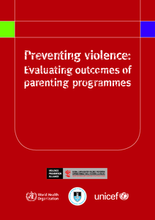This report, published by WHO, seeks to increase understanding of the need for, and the process of, conducting outcome evaluations of parenting programmes in low- and middle-income countries. The guidance is aimed at policy-makers; programme planners and developers; high-level practitioners in government ministries; representatives of nongovernmental and community-based organizations; and donors working in the area of violence prevention.
The result of a collaboration between the University of Cape Town, WHO, UNICEF, and the WHO-led Violence Prevention Alliance, the guidance is aimed at policy-makers; programme planners and developers; high-level practitioners in government ministries; representatives of nongovernmental and community-based organizations; and donors working in the area of violence prevention.
The publication focuses on parenting programmes to prevent child maltreatment and other forms of violence later in life such as youth and intimate partner violence. It is made up of three main sections:
- Section 1 defines outcome evaluations, explains why they are important and counters some of the oft-encountered justifications for not doing them.
- Section 2 reviews the evidence for the effectiveness of parenting programmes to prevent violence, discusses adapting parenting programmes to other cultures, and identifies some of the main features of effective programmes.
- Section 3 describes the activities that need to be completed before an evaluation can be carried out and the six steps of the evaluation process.
Supplementing this publication is a web-appendix which includes links to useful evaluation websites, evaluation guides, key scientific papers on evaluation, and a list of evaluators working in the area of parenting programmes to prevent violence.

